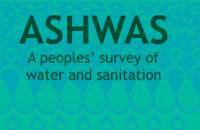Toilets and Urinals
Speakers and presentations of WHSC 2009 day 3 Ashok Jaitly talks about the policy issues on water conservation
Posted on 22 Nov, 2014 10:30 AMAshok Jaitly, Water Resources Department, TERI
Policy issues in water conservation
Habil Attarwala, Furaat Earth Ltd., Gujarat
Sanitation during wars and emergencies
Posted on 22 Nov, 2014 10:30 AMDuring conflicts and wars, many die as a consequence of bombings and battles. To the death toll, many more zeroes get added in the days and months to follow! Poor hygiene and sanitation takes several hundred lives in the refugee settlements.
ASHWAS A peoples survey of water and sanitation in Karnataka 2009
Posted on 22 Nov, 2014 10:30 AM
This report includes the findings of the ASHWAS survey (A Survey of Household Water and Sanitation), a participatory survey carried out by Arghyam, that included 28 districts of Karnataka covering more than 17,200 households across 172 gram panchayats (GPs). This was a peoples' survey, and the surveyors were selected from the respective communities that included students, women from self help groups, local NGO partners and other volunteers.
Sustainable and Ecological Sanitation Experiences
Posted on 22 Nov, 2014 10:30 AMA consultation was organised by Arghyam Trust in September 2009, to share experiences on Sustainable and Ecological Sanitation with the Planning Commission.
Book review :The Big Necessity
Posted on 22 Nov, 2014 10:30 AM
The Big Necessity - The unmentionable world of human waste and why it matters By Rose George
An update on ecosan work in India
Posted on 22 Nov, 2014 10:30 AMPrakash Kumar, an ecological sanitation consultant with UNICEF/Stockholm Institute provides an update on some recent work on ecological sanitation in India:
====
- We are in the process of supporting I I T Delhi for nutrient recovery project for developing complete process for converting liquid urine in to the crystalline form.
- We are in the final stage of supporting SCOPE for demonstration of ecosan toilet in a govt. middle school at Musiri, Trichy.
- Comprehensive evaluation of Tamilnadu ecosan project will be taken up shortly.
- Last batch of training of CCDU officials have been completed . This year total 5 batches got training on ecosan.
Sanitation in the flood affected areas : Biome Solutions
Posted on 22 Nov, 2014 10:30 AMBiome Solutions, a Bangalore-based company working on sustainable architecture and buildings visited some flood affected areas in Guntur to observe the situation and see the suitability of applying "Ecological Sanitation", a new approach to sanitation. (Search on India Water Portal for "Ecological sanitation" for more information on this). Their report after their travels can be seen below.
A point of interest is the picture of a flooded toilet. Pit toilets which are the norm in rural areas have the disadvantage that during floods the pit below the toilet (where the human waste accumulates over time) gets flooded and the toilet becomes unusable. The faecal matter can come out of the toilet pan and create a real mess which needs to be cleaned up.
Read their report at:
http://biomesolutions.blogspot.com/2009/10/visit-to-flood-affected-areas-in-guntur.html
Water resources in Jhansi and Tikamgarh districts Madhya Pradesh : A status report 2007
Posted on 22 Nov, 2014 10:30 AMThis status report prepared by Development Alternatives contains brief background information about the Bundelkhand region, details about the physical profle (topography, drainage and river systems, land usage, climate, rainfall), water resources information (water demand, availability, supply and accessibility) and information on sanitation practices (toilets, personal hygiene, solid waste management, liquid waste disposal, availability of water for sanitation).
Progress on drinking water and sanitation Special focus on sanitation
Posted on 22 Nov, 2014 10:30 AM This report found on the World Health Organisation site has been brought out by the WHO/UNICEF Joint Monitoring Programme for Water Supply and Sanitation, that tracks the progress on target 10 of the Millennium Development Goals (MDGs), which is "To halve, by 2015, the proportion of people without sustainable access to safe drinking water and sanitation".
2008 being the International Year of Sanitation, the report highlights the importance of sanitation, as being the crucial stepping stone to health , which offers:
Water supply and sanitation Assessment : A WHO-UNICEF sponsored study 2002
Posted on 22 Nov, 2014 10:30 AMThis report includes the findings of a study by the Planning Commission sponsored by the World Health Organisation and The United Nations Children's Fund (UNICEF) that conducted an assessment of the water and sanitation situation in India in 2002. The assessment revealed that:





